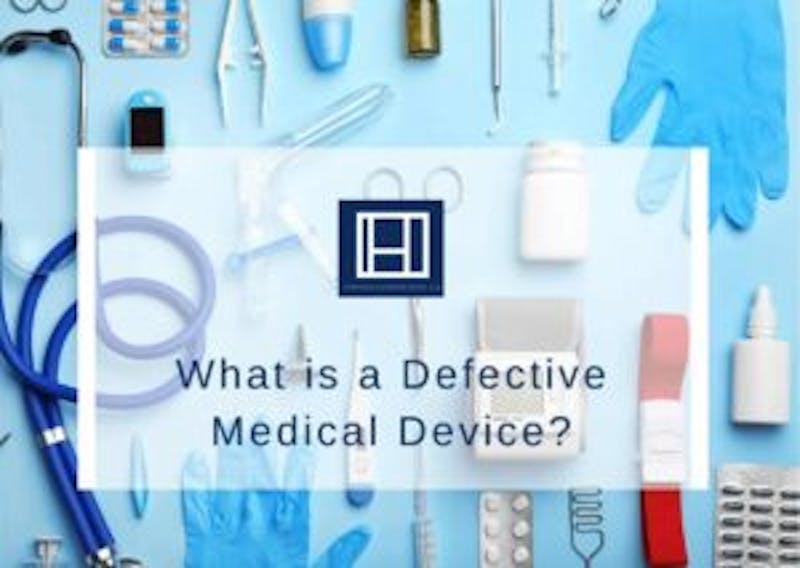
Medical devices can help us achieve better health, gain mobility, and decrease pain. However, defective medical devices can have the opposite effect, causing unintentional injuries to patients. There are thousands of new medical devices approved by the Food and Drug Administration (FDA) every year. Unfortunately, not all of them undergo the type of rigorous testing that would make patients aware of any potential defects. When a defective medical device leads to a product liability lawsuit, the victim can recover compensation for the damages they have incurred due to the defective medical device.
Common Types of Defective Medical Devices
Medical devices include any type of equipment or instrument used in a patient’s medical treatment. Medical devices range from simple devices like stethoscopes and tongue depressors to the most complex type of devices, such as surgical robots and defibrillators. Over the last 50 years, many different types of medical devices have faced legal trouble due to defective parts that caused injuries. Some defective medical devices that have been recalled and involved in product liability lawsuits include the following:
- Defibrillators and pacemakers
- Hip implants
- Drug-coated stents
- IVC blood clot filters
- Transvaginal mesh implants
- Insulin pumps
- Infusion ports
- Surgical robots
- Contraceptive and other birth control devices
Product Liability Claims
The FDA is responsible for regulating all medical devices. The goal of this type of regulation is to protect the public from potentially dangerous devices. Unfortunately, numerous victims of defective products typically become injured before the product is discovered to be defective and recalled. When a device has been deemed effective after it is on the market, the FDA can choose to issue a medical device recall. The FDA has the regulatory authority to recall potentially dangerous pharmaceutical drugs as well as medical devices.
If a defective medical device has injured you or your loved one, you will need to bring a product liability lawsuit against the at-fault party. You will also need to prove that a defect in the manufacturing process, design, or marketing strategy resulted in your injuries. There are several different types of defective medical device claims, including the following.
Defective Manufacturing
The manufacturer improperly fabricated or damaged the device in some way during the manufacturing process. The defective damage may have occurred between the manufacturing facility’s actual manufacturing and the retail location where you or your doctor purchased the device.
Design Defect
In other cases, the defectively designed medical device was correctly manufactured. However, the design itself poses an unreasonable danger of harm resulting in a patient’s injury. The defect is not due to a mishap or error during the manufacturing process, but arises because all the products are inherently dangerous due to their defective design.
Failure to Warn
Finally, the manufacturer, distributor, or retailer may have failed to warn patients and customers about defective medical devices. In these cases, the device was manufactured properly and was not considered to be unreasonably dangerous. However, a patient became injured because the patient was not provided accurate or adequate warnings about the potential danger posed by the medical device. The patient may not have been given adequate instructions about the appropriate use of the device.
Schedule a Free Legal Consultation Contact Us
Damages Available in a Defective Medical Device Case
If you decide to pursue damages through a product liability claim, your personal injury attorney will file a lawsuit for damages. In Alabama, there are various types of damages to which you may be entitled. The two basic categories of damages are compensatory and punitive damages.
Compensatory damages are damages that have a monetary value attached to them for your economic and non-economic losses. Economic losses are easy to quantify, such as your past and future medical expenses, lost wages, and any property damage. Non-economic damages are less tangible and include damages like pain and suffering or loss of consortium.
In some rare cases, a victim may recover additional punitive damages. When you can prove that the manufacturer of a defective medical device knew about the danger posed by the device but concealed it or delayed taking it off the market, you could receive additional punitive damages.
Contact an Experienced Medical Device Attorney
If you suspect or have reason to believe that you have suffered an injury due to defective medical devices, it is crucial that you discuss your case with an attorney as soon as possible. Defective medical device cases are complex, and your attorney will need as much time as possible to gather evidence. Contact the product liability attorneys at Heninger Garrison Davis today to schedule your initial consultation.
